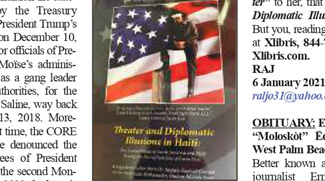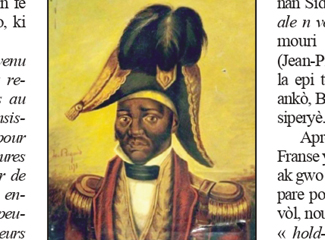
HAPPENINGS !
- Book Review : An indictment of U.S. Policy in Haiti By Raymond Alcide Joseph
“Theater and Diplomatic Illusions in Haiti” by Dr. Jacques-Raphaël Georges “Theater and Diplomatic Illusions in Haiti” by Dr. Jacques-Raphaël Georges is an indictment of his government for the policy carried out by Ambassador Michele J. Sison, who was sworn-in, on February 12, 2018, as the top American diplomat in Port-au-Prince. Nearing the end of her tour of duty, one wonders whether she will write a rebuttal to clear up matters and try, even at this late hour, to distance herself from what has been a disastrous mission.
The book, in English and French back-to-back, has two subtitles that embrace a theme which calls into question the hypocrisy of the United States in upholding treaties intended to reinforce democratic governance and respect for human rights, thus the first subtitle “The United States of North America and Haiti facing the Pact of San Jose of Costa Rica.” And the second puts the onus on the current U.S. ambassador who has closed her eyes to violations of democratic principles and kept mum about human rights abuses, thus a “Registered Letter from Dr. Jacques-Raphaël Georges to the American Ambassador, Madam Michel Sison.”
The pact mentioned above, signed in San Jose, the capital of Costa Rica, on November 22, 1979, is also known as the “American Convention on Human Rights,” sworn to by the members of the Organization of American States (OAS), Cuba excepted because, at the demand of the U.S., it was expelled, in 1962, from the hemispheric organization, when it joined the Soviet bloc.
At the outset, in the first chapter, addressing, the ambassador, Dr. Georges writes: “Madam, events occurring in Haiti in recent years make my letter all the more urgent and fitting. The bells of our cathedrals never ring the same toll twice on any given day, without publicly witnessing your trial, that of your peers, to put it in a paraphrase, that of the free, Christian, and democratic West over a crapulous murder or a government’s arrogant abuse of power in the streets of Port-au-Prince.” What a poetic description of the horror holding sway in Haiti under the glares of Ambassador Sison and all her colleagues of the CORE Group, those representatives of the “free, Christian and democratic West!”
Mind you, when the book was published in August 2020, the assassination of eminent lawyer Monferrier Dorval, the president of the Bar of Port-au-Prince, had not yet occurred, on August 29, a few yards from the president’s private residence. Neither had several other gruesome assassinations, including that of 22-year-old student Evelyne Sincère, which became a cause célèbre. Neither had the gangs, with connection to some high authorities, unleashed their year-end campaign of kidnapping-for-ransom, the latest daring example being that of Police Inspector Wilner Séraphin, on January 3, in downtown Port-au-Prince, with the heavily armed kidnappers asking a ransom of $1 million for his release.
One even wonders whether the denunciations of modern-day prophet Dr. Georges may have influenced some actions internationally. We would mention the statement issued by the Treasury Department of President Trump’s administration, on December 10, sanctioning senior officials of President Jovenel Moïse’s administration, as well as a gang leader close to the authorities, for the Massacre of La Saline, way back on November 13, 2018. Moreover, for the first time, the CORE Group has since denounced the latest two decrees of President Moïse who, on the second Monday of January 2020, had engineered the dysfunction of Parliament, to assume dictatorial control of the “democratic” Republic of Haiti. Where were they all along?
Dr. Georges, born in Haiti, a naturalized American who is now a professor in an American University, after serving in the U.S. Navy medical corps, does not take lightly what he has done in coming forward with his damning indictment. Let him explain: “I risk drawing upon my head all the thunderbolts of hell. Should I tremble? . . . I have learnt to live dangerously. Having been a member of the United States Medical Corps, I have also grown to see Haiti not only as my homeland, but as both a casualty of unpatriotic Haitians and the international community, which I call with a touch of perverse cynicism, international criminality.” (Bold, his).
(About “unpatriotic Haitians,” he told me earlier this week, “I don’t ascribe to the term Diaspora anymore because some Haitians in the Diaspora have betrayed the country by providing support to Jovenel Moïse in his dismantling of Haiti’s Constitution. I prefer to be known as ‘Haïtien en dehors’ –Haitian abroad.”) In fact, this fits in with a quote from Louis Antoine Staint-Just that the author has made his own, having it on the cover of his book: “I don’t belong to any faction. I will fight them ALL.”
Not wanting to be misunderstood, after the unvarnished language he used in denouncing those responsible for Haiti’s downfall, including his own adopted country, he lets the Ambassador know that he has not wavered in his patriotic favor toward the United States: “Be mindful, Madam, that I did swear to defend the Constitution and the flag of the United States of America against all enemies, foreign and domestic! I measure fully, Madam, all the discomfort my position may cause. However, there is no other way to go if I want to be lucid, courageous, and brutally honest, which is not, –you will agree—an unreasonable ambition.”
In mentioning his allegiance to the Constitution, Professor Georges stands on firm ground, especially at a time when the national Charter is under attack from those who have sworn to uphold it. Indeed, while pleading for respect for democracy and human rights in his land of birth, he makes an appeal to his adopted land. to remain true to the principles that make it great.
Read this: “Madam, American foreign policy, indeed, has been going through a rough mutation during the last couple of years. Thus, it is important, if we want to protect it from losing all its appeal, that is to say, all its efficiency and authority, we must strive to strengthen it by correcting its imperfections, by breathing new life into it and bringing it up to date, while avoiding to give rise to a wandering embassy that would sulk, and, perhaps sell off all liberties.”
As a reminder, these words were written in July, published in August, before the November 3 elections in the United States, the results of which are still being contested by President Donald Trump, who has revealed himself to be equal to a Banana Republic leader in his desperate attempt to deny the will of the people that rejected his policies that have led to the “rough mutation in the last couple of years,” during which a budding dictatorship in Haiti has been protected by American Ambassador Michele Sison.
In just under 100 words, in 10 short chapters, Dr. Jacques-Raphaël Jacques has made public this “registered letter” which has yet to receive an official response. He told me that copies of the book were sent to Helen Meagher La Lime, Special Representative of the U.N Secretary General in Haiti; to Ambassador José Gomez of France; to President Luis Abinader of the Dominican Republic; to Luis Almagro, Secretary General of the Organization of American States, and to Kelly Craft, the U.S. Ambassador to the United Nations. Following the assassination of Monferrier Dorval, president of the Port-au-Prince Lawyers Asssociation, he rushed a copy to the president of the Bar of Paris, France.
We had no luck in reaching Ambassador Sison to obtain a reaction to the “Registered Letter” to her, that is “Theater and Diplomatic Illusions in Haiti.” But you, reading this, can order it at Xlibris, 844-714-8691; www.Xlibris.com.
RAJ, 6 January 2021, at raljo31@yahoo.com
OBITUARY: Ernest Laventure “Moloskòt” Ēdouard died in West Palm Beach, Fla.
Better known as Moloskòt, the journalist Ernest Laventure Ēdouard died on the porch of his home in West Palm Beach, Florida, on Saturday, December 2 nd , a little after 3:00 pm, EST, not from COVID-19, but from heart failure, having been hospitalized several times. Born February 25, 1963, he was about two months short of his 58 th birthday.
Reached at home, his widow, Pastor Gertrude Ēdouard, née Richemond, told me, “he knew he would be leaving us, but he said he had to have the January soup.” Indeed, he downed the soup with much appetite on January 1st, said Mrs. Ēdouard, who added that on the 2nd, he asked for more of the soup of which plenty was left. “Again, he enjoyed his soup,” she said. Thus, to the end, Moloskòt held to the traditional soup of independence.
On January 2 nd , the renowned journalist received a call from a friend who wanted to come visit him. “In this era of COVID-19,” Mrs. Ēdouard told me, “I don’t receive visitors in the house. But I told him he can receive his guest on the porch.”
Around 3:00 pm, when the visitor arrived and the bell rang a few times, with no movement from Moloskòt, Mme Ēdouard said she went to the porch to see what happened. His head had dropped over the chair. When she tried to wake him up, there was no response. She called 911, and the ambulance came. The health workers did the usual about taking vital signs, looked at her and said nothing. They left with him. From the hospital, she received a call to confirm the news she already knew: Her husband has died.
Known for his special theme of “Les Grands Dossiers,” Moloskòt was a regular on the YouTube “Haitian Public Media” network, based in Florida. He began his career in his hometown of Gonaïves and made a name for himself at Radio Cacique in Port-au-Prince. A supporter of Michel Martelly, he had a falling out with that team when he wanted to run for Senator of the Artibonite, a post also coveted by Sophia Saint-Rémy Martelly, the president’s wife, who is also from Gonaïves. In 2013, he fled Haiti with the help of some friends in Florida and has been there ever since. Though not a supporter of Jovenel Moïse, he remained an ally of Laurent Lamothe, formerly Prime Minister under Michel Martelly, who is now an ally of Jovenel Moïse and gunning for Haiti’s presidency, therefore a competitor of Michel Martelly.
To his widow, Gertrude Richemond Ēdouard, who was there with him at all times, to his siblings, other family members and friends affected by his death, the staff and editors of the
Haiti-Observateur present their sincere condolences.
No information was available as to whether there would be any memorial service.
HERE AND THERE
*Police Inspector Wilner Séraphin was kidnapped on Sunday, January 3, in downton Port-
au-Prince. As reported by the on-line Vant Bef Info (VBI) blog, the high-ranked Police officer at the Delmas 3 Police sub-station was overpowered early Sunday at Pavé Street, in the heart of the capital, by heavily armed bandits. They have asked a ransom of $1million for his release. No information was available about his fate when we went to press late Tuesday night, January 5.
If members of the Police, trained in strategy to combat kidnapping and banditry in general, cannot protect themselves from the “legal bandits,” how will they be able to protect the citizenry?
*Three individuals wearing soldiers’ uniform were killed on Saturday, December 2 nd, and several wounded in a clash with the Police. According to Police reports, these so-called soldiers are members of the “Security Brigade for Environmental Protection,” (French acronym BSAP), a group operating under the leadership of Jeantel Joseph, who has the title of “Director General.” In a public statement, Mr. Joseph said those are not his people. Since the Police said they arrested the leader of the group during the operation in the vast Canaan slum, in the county of Croix des Bouquets, some 15 miles from the capital, probably he will spill the beans.
The first time, information about the BSAP leaked out was on December 13, when President Jovenel Moïse was visiting Ouanaminthe, in the Northeast region of the country. In uniform, some of them came from their camp in the area to protest the fact that they had not been paid for months. Of course, by the government, which apparently had them in training for an unknown mission, probably to help in establishing the Jovenel Moïse dictatorship.
By last week, they were blocking the Route National No. 1, leading north from the capital. They seized vehicles from their owners, especially heavy trucks which were parked over the road in the Carriès area, and intimidated the citizens. Apparently, they were headed to Port-au-Prince where the money is.
*For the 217 th anniversary of Haitian Independence, President Moïse missed the traditional Te Deum, attended by several opposition leaders. As it is, on January 1 st every year, the city of Gonaïves, in north central Haiti, takes center stage. That is where Jean-Jacques Dessalines declared Haiti’s independence, following the November 18, 1803 defeat of Napoleon Bonaparte’s cracked troops at Vertières, in the outskirts of Cap-Haitian. This is the third consecutive year that the Head of State, fearing for his security, failed to attend this highly symbolic event, just as he has missed other such ceremonies at Vertières and Pont Rouge, at the northern entrance to Port-au-Prince.
But around 6 am, on the 1 st , before people took to the streets, the president, accompanied by a few of his collaborators, including new interim National Police Chief Léon Charles, had rushed to the MUPANAH, the Museum dedicated to Haitian heroes, to lay a wreath there in their memory. To be noted, the MUPANAH is a few yards from the Palace, and the president needs no caravan to get there. He just walks the few steps, arriving in about five minutes. Thus, more and more, Mr. Moïse is being mocked as “The President of the Champ de Mars,” not of the Republic of Haiti.
- RAJ, 6 January 2021
Cet article est publié par l’hebdomadaire Haïti-Observateur (New York) VOL. LI No. 1, édition du 6 janvier 2021, et se trouve en P. 1, 7 à : http://haiti-observateur.org/wp-content/uploads/2021/01/H-O-6-jan-2021.pdf




